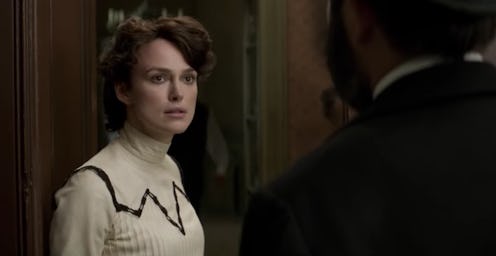Entertainment
Kiera Knightley’s New Role Will Make You Want To Know Everything About One Revolutionary Writer
Colette, expanding in theaters on Oct. 12, is another Keira Knightly period piece, but it also may be one of the most culturally relevant movies to come out in 2018. That's because the movie portrays a queer woman whose controlling husband takes credit for her work, and it's all about discovering one's autonomy in life. The best part of it all is that Colette's exciting plot is true and based on the life of real-life novelist and actor Sidonie Gabrielle Colette.
According to her New York Times' obituary from 1954, the author's full name was actually Sidonie Gabrielle Claudine Colette Gauthier-Villars de Jouvanel Goudeket thanks to her multiple marriages. She was born in a small town in Burgundy in 1873, and she lived there until she met her first husband, Henri Gauthier-Villars aka Willy (Dominic West in the film), at age 20. Colette the movie mostly focuses on their marriage and working relationship, as the latter enlisted his wife to ghost-write for him under the name "Willy." For over 10 years, Colette wrote novels under Willy's name, starting with her first novel Claudine in School (Claudine à l'école). According to Refinery29, Colette only thinly veiled Claudine as a fictional novel, as it so thoroughly resembles the author's own upbringing in Burgundy.
According to Time, using Willy's name on Colette's books became a point of contention for the couple. So later in their relationship, they began using "Willy and Colette Willy," for some of Colette's books. But only after Willy died in 1931 was Colette's name put for the books she'd written for him.
Colette and Willy had an open marriage, and the movie portrays both of them pining after a visitor from the U.S. named Georgie Raoul-Duval (Eleanor Tomlinson). As Time points out, it was common during the turn of the century for “upper-class and bohemian" French marriages to allow infidelity, but Colette and Willy's marriage became a special case when both of them openly dated women. While she was married to Willy, Colette saw Napoleon III’s niece, Matilde de Morny, or Missy, (Denise Gough) who cross-dressed as a man. Willy, on the other hand, had his own girlfriend, and the four of them even went on vacation together, per Refinery29.
Colette and Willy's relationship ended in the early 1900s, and that's where Colette the movie ends. Based on various biographies of the French author, Colette's story got even more surprising from there. First, Missy and Colette remained together for a few years longer, and an introduction to Colette's book The Vagabond, written by Stanley Applebaum, reports that Missy and Colette kissed on stage at the Moulin Rouge in 1907, shocking audiences. That relationship ended in 1911, according to Applebaum, and from there Colette went on to marry male newspaper editor named Henry de Jouvenel.
According to Time, Colette ended up having an affair with Henry de Jouvenel's 16-year-old stepson. That salacious affair took place around the time that Colette published a book called Cheri, which happens to tell the story of an 18-year-old man who starts an affair with one of his mother's friends, who's 24 years older than he is. Refinery29 states that Colette and Henry later divorced and the author went on to date more women and finally marry one last man whom she was with when she'd died in 1954 in Paris.
You can probably tell just from Colette's life story that the eponymous character in the new period biopic doesn't attempt to follow her society's expectations of how a woman should behave. For moviegoers of today, watching a movie about a woman living life on her own terms — even over a century ago — could be extremely inspiring.
